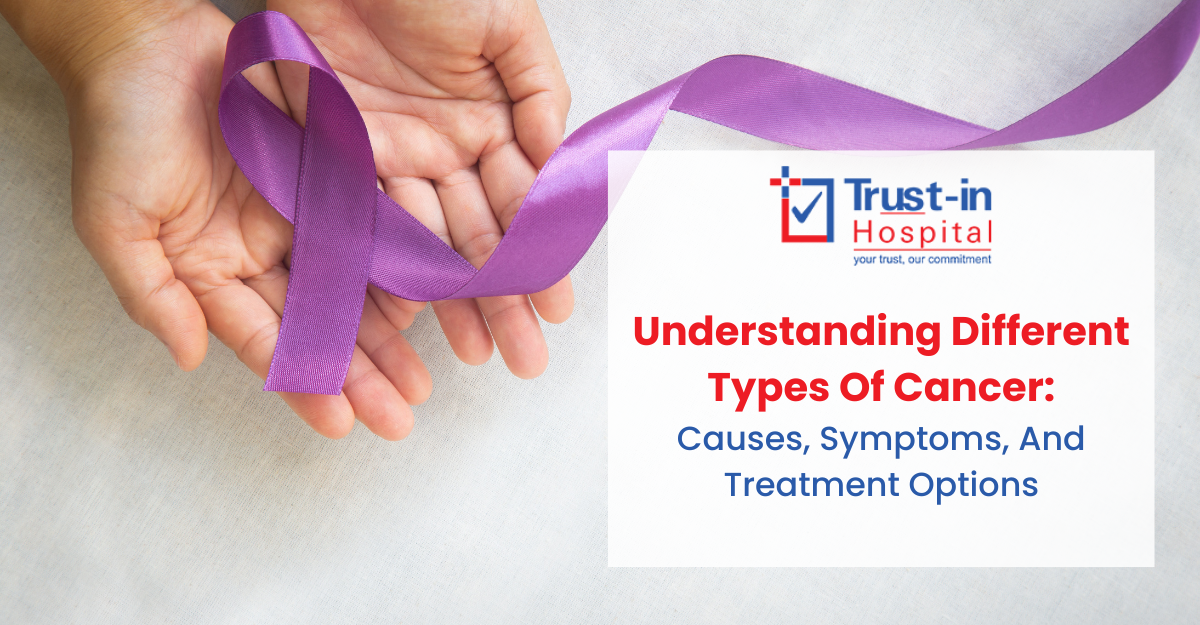
Cancer is a group of diseases characterised by the uncontrolled growth and spread of abnormal cells. If not controlled, cancer can result in death. However, advancements in medical research have paved the way for various cancer treatments and management strategies. This article aims to provide a comprehensive understanding of different types of cancer, their causes, symptoms, and treatment options.
What is Cancer?
Cancer arises when cells in a part of the body begin to grow out of control. Unlike normal cells, cancer cells continue to grow and divide, creating new, abnormal cells. They can invade other tissues, a process known as metastasis. There are more than 100 types of cancer, and they are usually named after the organ or type of cell in which they start.
Common Types of Cancer
1. Breast Cancer
Breast cancer begins in the cells of the breast, usually in the lining of the milk ducts or lobules. It predominantly affects women, though men can also develop it.
Causes:
- Genetic mutations (BRCA1 and BRCA2 genes)
- Hormonal factors
- Lifestyle factors (diet, exercise)
Symptoms:
- A lump in the breast
- Change in size, shape, or appearance of the breast
- Nipple discharge
Treatment Options:
- Surgery (mastectomy or lumpectomy)
- Radiation therapy
- Chemotherapy
- Hormone therapy
- Targeted therapy
2. Lung Cancer
Lung cancer begins in the lungs and is strongly associated with smoking, though non-smokers can also develop it.
Causes:
- Tobacco smoke
- Exposure to radon gas
- Asbestos exposure
- Air pollution
Symptoms:
- Persistent cough
- Chest pain
- Shortness of breath
- Coughing up blood
Treatment Options:
- Surgery
- Radiation therapy
- Chemotherapy
- Targeted therapy
- Immunotherapy
3. Prostate Cancer
Prostate cancer is a common cancer in men that begins in the prostate gland.
Causes:
- Age
- Family history
- Race (more common in African American men)
- Diet
Symptoms:
- Difficulty urinating
- Blood in urine or semen
- Erectile dysfunction
Treatment Options:
- Surgery (prostatectomy)
- Radiation therapy
- Hormone therapy
- Chemotherapy
- Targeted therapy
4. Colorectal Cancer
Colorectal cancer starts in the colon or rectum and is often detected through screening tests like colonoscopies.
Causes:
- Genetic factors
- Diet (high in red and processed meats)
- Lifestyle factors (lack of physical activity, obesity)
- Inflammatory bowel disease
Symptoms:
- Changes in bowel habits
- Blood in stool
- Abdominal discomfort
- Unexplained weight loss
Treatment Options:
- Surgery
- Radiation therapy
- Chemotherapy
- Targeted therapy
- Immunotherapy
5. Skin Cancer (Melanoma)
Melanoma is the most serious type of skin cancer, developing in the cells (melanocytes) that produce melanin.
Causes:
- UV radiation from the sun or tanning beds
- Genetic factors
- Fair skin, light hair, and eyes
Symptoms:
- A new, unusual growth or a change in an existing mole
- A sore that doesn’t heal
- Spread of pigment beyond the border of a mole
Treatment Options:
- Surgery
- Radiation therapy
- Chemotherapy
- Immunotherapy
- Targeted therapy
Causes of Cancer
Cancer is caused by changes (mutations) to the DNA within cells. The DNA inside a cell is packaged into a large number of individual genes, each of which contains a set of instructions telling the cell what functions to perform, as well as how to grow and divide. Errors in these instructions can cause the cell to stop its normal function and may allow a cell to become cancerous.
Symptoms of Cancer
The symptoms of cancer vary widely based on the type and location of the disease. However, some common symptoms include:
- Unexplained weight loss
- Fatigue
- Persistent pain
- Fever
- Skin changes
- Changes in bowel or bladder function
- Unusual bleeding or discharge
- Persistent cough or trouble breathing
Cancer Treatment Options
There are several treatment options available for cancer, and the choice of treatment depends on the type and stage of cancer, as well as the patient’s overall health. Here are some common cancer treatments:
1. Surgery
Surgery is often used to remove a tumour or cancerous tissue from the body. It is most effective for cancers that are localised and have not spread.
2. Radiation Therapy
Radiation therapy uses high-energy rays to kill cancer cells. It can be used alone or in combination with other treatments. It is particularly effective for treating localised cancers.
3. Chemotherapy
Chemotherapy involves using drugs to kill cancer cells. It is a systemic treatment, meaning it affects the entire body. Chemotherapy can be used to treat cancer that has spread to other parts of the body.
4. Targeted Therapy
Targeted therapy targets specific molecules involved in cancer growth and spread. These therapies work by interfering with the growth and spread of cancer cells while minimising damage to normal cells.
5. Immunotherapy
Immunotherapy uses the body’s immune system to fight cancer. This can include treatments like checkpoint inhibitors, which help the immune system recognise and attack cancer cells.
6. Hormone Therapy
Hormone therapy is used to treat cancers that are hormone-sensitive, such as breast and prostate cancer. It works by blocking the body’s ability to produce hormones or by interfering with the effects of hormones on cancer cells.
Seeking Professional Help
If you are experiencing symptoms of cancer or have been diagnosed with the disease, it is crucial to seek professional help from an experienced oncologist in Bangalore. At Trust-In Hospital, we have a team of highly skilled oncologists in Bangalore who are dedicated to providing comprehensive cancer care. Whether you need a diagnosis, treatment, or ongoing management of cancer, our experts are here to support you every step of the way.
Conclusion
Understanding different types of cancer, their causes, symptoms, and treatment options is essential for early detection and effective management. With advancements in medical science, many types of cancer can be treated successfully, especially when detected early. If you or a loved one is facing cancer, trust the expertise of oncologists in Bangalore at Trust-In Hospital to provide the best care and support throughout your cancer treatment journey.
Remember, early detection saves lives. Regular check-ups and being aware of the symptoms can make a significant difference. For more information or to schedule a consultation with an oncologist in Bangalore, visit our website or call us at Trust-In Hospital.
Author Profile:
Trust-in Hospital is a major multi-speciality medical hospital in Bangalore. Its mission is to provide high-quality, personalised healthcare to patients. The best and most skilled specialists work at this cutting-edge hospital. It integrates advanced medical technologies and modern infrastructure to provide comprehensive and cost-effective care to both outpatients and inpatients using a multidisciplinary approach.

